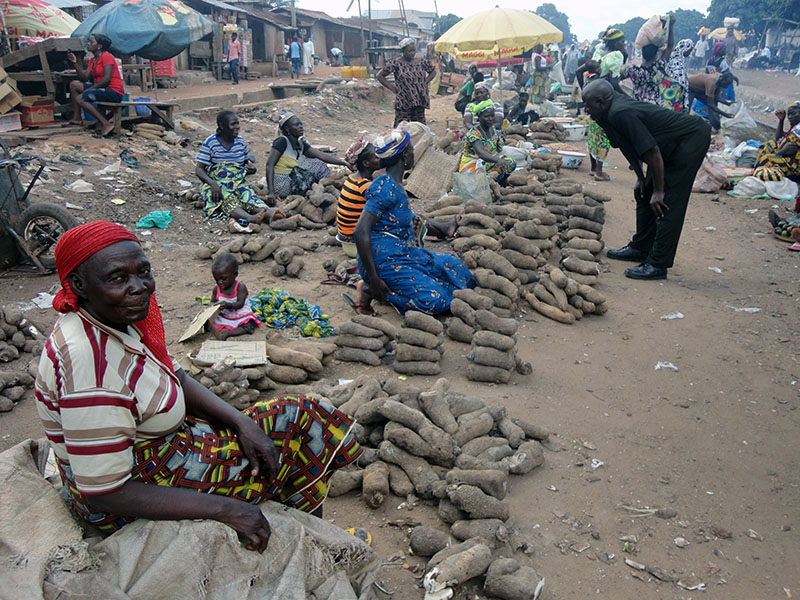Economy
Nigerian Yams Not Rejected Abroad—Exporters

By Modupe Gbadeyanka
The exporters of yam to the United Kingdom and the United States have disputed the reports, initially aired by the Africa Independent Television (AIT), purporting that the yams exported after the official flag-off ceremony on June 29, 2017 were rejected at their export destinations.
The symbolic event, done at the Lilypond Container Terminal in Lagos by the Minister of Agriculture and Rural Development, Mr Audu Ogbeh, meant to boost the morale of Nigerian exporters and make a bold statement to the global marketplace, has drawn widespread criticisms on various media platforms.
A statement issued by the Minister’s Special Adviser on Media and Communications, Mr Olukayode Oyeleye, stated that the concerned exporters and other prospective exporters have expressed worries about the potential impact of the negative publicity on their prospects at the export market in the wake of federal government’s initiative on diversification of the economy through agricultural produce export.
Most commentators and analysts in the mainstream and social media have retailed the negative aspect of the laudable initiative and have played up the wrong versions of the export story. Discussions with the exporters have since shown the prevailing storyline as inappropriate and misleading.
First, the exporters to the UK and US have emphatically said that their consignments were successfully cleared at the ports and delivered them to their various warehouses. They said, although some cases of tuber spoilage were reported in both cases, these were separated from the good ones, and the good ones were distributed to the buyers.
The exporters noted that Ghana, which has been exporting yams for a while, routinely records cases of spoilage, without making any public issues therefrom; and their yams don’t get rejected as a result.
Mr Michael Adedipe of ADES UK Foods and Drinks for the UK, whose warehouse was visited by AIT, has deplored the AIT report and other subsequent commentaries about rejection of his yams by the UK authorities.
Mr Adedipe has said emphatically that the consignment was not rejected; “It was cleared.”
According to Mr Adedipe, who confirmed that he spoke to AIT, “I’ve watched the (TV) programme which lasted for about two hours. All the positive stuff removed. We that decide to venture in this project are aware of the risks involved because, this fresh produce … we’ll expect five or 10 percent damages. I don’t know why they said the product got rejected. I’ve sent my release note. I’ve sent video of loading. I’ve sent every documentation to say that there is no issue like that at all.”
On the spoilage of yam, Mr Adedipe explained that “the failure has nothing to do with the Ministry of Agriculture, but the Nigerian Ports Authority (NPA). That’s where I see the failure.”
He expressed disgust at the mishandling of his comments by the AIT reporter, saying: “I told him, he is aware of it. He knew about the delay, I told him about all the consignment. He knew every single thing that happened. But what he did the most is to use all the negative stuff. We talked about other things. I told him how I came into the UK to go and fix our problem. All those were removed from the report.”
Mr Adedipe, who has vowed not to stop yam export business, disclosed that “the other mistake was the shipping line we used. But they were the ones that were available.”
According to him, in spite of the sour experience with media report, “I’m willing to invest. I still expect…at least to take a container from Nigeria every week.”
Managing Director of Wan Nyikwagh Farms Nigeria Limited, Mr Yandev Amaabai, has strongly disputed the yam rejection story and said it doesn’t even tally.
“The story from AIT was focused on the UK. So far, I am the only person who has lifted yam to the US. Whatever we can do to clarify this issue will be good. We learn as we progress. The whole idea that government brought was to diversify the economy.”
“My goods actually got to the US on September 7, 2017. The ship berthed on September 2, 2017, but, because of the flooding in Texas, we couldn’t discharge until the 7th. They were cleared from the Customs and brought to the warehouse on the 7th. Yams are perishable items and, definitely, some may go bad on the way. But, this statement that says the American government rejected Nigerian yams, where does it come from?
“Our yams were released to us and we took them to the stores. We sorted out our yams when they got there. We distributed them to the off-takers. So, where they got this story from, I don’t know. Nobody has ever called from anywhere, even in the US, to ask me question. If a few yams got rotten, and I am not complaining, why are people crying more than the owner? I have all the papers. The Customs cleared my goods on the other side. And these things went to my warehouse from where we distributed.”
If Ghana, which produces 4.8 million tonnes of yams, according to 2008 estimates, occupies a niche as the leading exporter of crop, accounting for over 94 percent of total yam exports in West Africa, Nigeria which is by far the world’s largest producer of yams, accounting for over 70 to 76 percent of the world production, producing 35.017 million metric tonnes valued equivalent of $5.654 billion by the 2008 estimates should do better than Ghana in the export market
Ghana is the first country in West Africa to launch its national yam development strategy in 2013. The country aims at US$5billion dollars of exports by 2018. Nigeria, which produces seven times Ghana’s production volume, is beset with criticisms over attempts to bring it to the global yam markets. About 90 per cent of Ghana’s yams are exported to the US, Canada, UK and elsewhere in Europe. There are more Nigerians than Ghanaians in these countries, meaning more prospects for Nigerian exporters.
Mr Ogbeh has said that Nigeria, the largest producer of yam in the world, is not anywhere near the capacity to export and remains so much a nation of consumers.
He stressed that “Nigeria must export” as the “country’s economy is increasing, and in ten years’ time, oil and gas is going to drop. Then we may have nothing to earn foreign exchange except we begin to diversify our export base now.”
With all these prospects in view, the Minister expressed surprise at the negative news trailing his effort at putting Nigeria on the global yam export market, saying “we’re not going to stop because this is not enough to demoralise us. We have food to export. Never mind what so-called critics are doing.”
“In the ministry of agriculture,” he said, “we are not exporters. The ministry does not export. We’re going to talk to the port authority on cooling vans for vegetables and fresh produce so that exporters don’t lose money and we don’t lose face. We should begin to build cold trucks that are temperature-controlled to keep the yams till the time they have to go. We should invest in special containers for their storage.”
“If other countries are doing it, we too can do it. We’re trying to take over the market. We’ve come to nearly 70 per cent of raw output of yams. Why can’t Nigerians in Texas, Canada, London and Germany have access to the yams?”
The Minister vowed that “we will go ahead with our efforts to export yam. We will not let this opportunity slip any further. We are determined to position our people to capture the investment opportunities and benefits in the yam export to these countries. We will fix the yam export value chain. We have the volume and the market.”
“We will emphasise global best practices, engage with world class experts and international organisations as well as leverage the strength in indigenous knowledge. We will support investment in relevant infrastructure and facilities.
“We will revive the abandoned yam conditioning centres in Ekiti and Nassarawa states while we encourage the construction of new ones with appropriate equipment to boost storage and export prospects. We appeal to Nigerians, in the spirit of patriotism, to see the silver lining around the cloud of the week of misinformation about yam export.
“We have commenced engagement with the National Assembly for the repeal of the 1989 law that prohibits export of yams and other agro-commodities.
“Currently, the bill has passed the second reading at the National Assembly. The continued existence of this law is an obstruction against the economic diversification and export initiative of this administration. We plead with the National Assembly to fast-track the repeal of the law and help us further unlock our export potential,” he said.
Economy
Flour Mills Supports 2026 Paris International Agricultural Show

By Modupe Gbadeyanka
For the second time, Flour Mills of Nigeria Plc is sponsoring the Paris International Agricultural Show (PIAS) as part of its strategies to fortify its ties with France.
The 2026 PIAS kicked off on February 21 and will end on March 1, with about 607,503 visitors, nearly 4,000 animals, and over 1,000 exhibitors in attendance last year, and this year’s programme has already shown signs of being bigger and better.
The theme for this year’s event is Generations Solution. It is to foster knowledge transfer from younger generations and structure processes through which knowledge can be harnessed to drive technological advancement within the global agricultural sector.
In his address on the inaugural day of the Nigerian Pavilion on February 23, the Managing Director for FMN Agro and Director of Strategic Engagement/Stakeholder Relations, Mr Sadiq Usman, said, “At FMN, our mission is Feeding and Enriching Lives Every Day.
“This is a mandate we have fulfilled through decades of economic shifts, rooted in a culture of deep resilience and constant innovation. We support this pavilion because FMN recognises that the next frontier of global Agribusiness lies in high-level technical exchange.
“We thank the France-Nigeria Business Council (FNBC), the organisers of the PIAS, and our fellow members of the Nigerian Pavilion – Dangote, BUA, Zenith, Access, and our partners at Creativo El Matador and Soilless Farm Lab— we are exceedingly pleased to work to showcase the true face of Nigerian commerce.”
Speaking on the invaluable nature of the relationship between Nigeria and France, and the FMN’s commitment to process and product innovation, Mr John G. Coumantaros, stated, “The France – Nigeria relationship is a valuable partnership built on a shared value agenda that fosters remarkable Intercontinental trade growth.
“Also, as an organisation with over six decades of transformational footprint in Nigeria and progressively across the African Continent, FMN has been unwaveringly committed to product and process innovation.
“Therefore, our continuous partnership with France for the success of the Paris International Agricultural Show further buttresses the thriving relationship between both countries.”
PIAS is one of the most widely attended agricultural shows, with thousands of people from across the world in attendance.
Economy
NEITI Backs Tinubu’s Executive Order 9 on Oil Revenue Remittances

By Adedapo Adesanya
Despite reservations from some quarters, the Nigeria Extractive Industries Transparency Initiative (NEITI) has praised President Bola Tinubu’s Executive Order 9, which mandates direct remittances of all government revenues from tax oil, profit oil, profit gas, and royalty oil under Production Sharing Contracts, profit sharing, and risk service contracts straight to the Federation Account.
Issued on February 13, 2026, the order aims to safeguard oil and gas revenues, curb wasteful spending, and eliminate leakages by requiring operators to pay all entitlements directly into the federation account.
NEITI executive secretary, Musa Sarkin Adar, called it “a bold step in ongoing fiscal reforms to improve financial transparency, strengthen accountability, and mobilise resources for citizens’ development,” noting that the directive aligns with Section 162 of Nigeria’s Constitution.
He noted that for 20 years, NEITI has pushed for all government revenues to flow into the Federation Account transparently, calling the move a win.
For instance, in its 2017 report titled Unremitted Funds, Economic Recovery and Oil Sector Reform, NEITI revealed that over $20 billion in due remittances had not reached the government, fueling fiscal woes and prompting high-level reforms.
Mr Adar described the order as a key milestone in Nigeria’s EITI implementation and urged amendments to align it with these reforms.
He affirmed NEITI’s role in the Petroleum Industry Act (PIA) and pledged close collaboration with stakeholders, anti-corruption bodies, and partners to sustain transparent management of Nigeria’s mineral resources.
Meanwhile, others like the Petroleum and Natural Gas Senior Staff Association of Nigeria (PENGASSAN) have kicked against the order, saying it poses a serious threat to the stability of the oil and gas industry, calling it a “direct attack” on the PIA.
Speaking at the union’s National Executive Council (NEC) meeting in Abuja on Tuesday, PENGASSAN President, Mr Festus Osifo, said provisions of the order, particularly the directive to remit 30 per cent of profit oil from Production Sharing Contracts (PSCs) directly to the Federation Account, could destabilise operations at the Nigerian National Petroleum Company (NNPC) Limited.
Mr Osifo firmly dispelled rumours of imminent protests by the union, despite widespread claims that the controversial executive order threatens the livelihoods of 10,000 senior staff workers at NNPC.
He noted, however, that the union had begun engagements with government officials, including the Presidential Implementation Committee, and expressed optimism that common ground would be reached.
Mr Osifo, who also serves as President of the Trade Union Congress (TUC), expressed concerns that diverting the 30 per cent profit oil allocation to the Federation Account Allocation Committee (FAAC), without clearly defining how the statutory management fee would be refunded to NNPC, could affect the salaries of hundreds of PENGASSAN members.
Economy
Dangote Cement Deepens Dominance, Export Activities With $1bn Sinoma Deal

By Aduragbemi Omiyale
To strengthen its domestic market dominance, drive its export activities, optimise existing operational assets and enhance production efficiency and capacity expansion, Dangote Cement Plc has sealed $1 billion strategic agreements with Sinoma International Engineering for cement projects across Africa.
The president of Dangote Industries Limited, the parent firm of Dangote Cement, Mr Aliko Dangote, disclosed that the deal reinforces the company’s long-term growth strategy and aligns with the broader aspirations of the Dangote Group’s Vision 2030.
According to him, Sinoma will construct 12 new projects and expand others for the cement organisation across Africa, helping to achieve 80 million tonnes per annum (MTPA) production capacity by 2030, while supporting the group’s overarching target of generating $100 billion in revenue within the same period.
Under the Strategic Framework Agreement, Sinoma will collaborate with Dangote Cement on the delivery of new plants, brownfield expansions, and modernisation initiatives aimed at strengthening operational performance across key markets.
The new projects include a new integrated line in Northern Nigeria with a satellite grinding unit, a new line in Ethiopia and other projects in Zambia/Zimbabwe, Tanzania, Sierra Leone and Cameroon. In Nigeria, Sinoma will also handle different projects in Itori, Apapa, Lekki, Port Harcourt and Onne.
The projects signal Dangote Cement’s sustained commitment to consolidating its leadership position within the African cement industry, while enhancing its competitiveness on the global stage.
Chairman of the Dangote Cement board, Mr Emmanuel Ikazoboh, during the agreement signing event in Lagos, explained that the new projects would enable the company to play a critical role in actualising Dangote Group’s Vision 2030.
The new projects, when completed, will increase Dangote Cement’s capacity and dominant position in Africa’s cement industry.
On his part, the Managing Director of Dangote Cement, Mr Arvind Pathak, said the agreement reflects the company’s determination to grow its investments across African markets to close supply gaps and support the continent’s infrastructural ambitions.
According to him, Dangote Cement is committed to making Africa fully self‑sufficient in cement production, creating more value and linkages, leading to increased economic activities and a reduction in unemployment.
-

 Feature/OPED6 years ago
Feature/OPED6 years agoDavos was Different this year
-
Travel/Tourism10 years ago
Lagos Seals Western Lodge Hotel In Ikorodu
-

 Showbiz3 years ago
Showbiz3 years agoEstranged Lover Releases Videos of Empress Njamah Bathing
-

 Banking8 years ago
Banking8 years agoSort Codes of GTBank Branches in Nigeria
-

 Economy3 years ago
Economy3 years agoSubsidy Removal: CNG at N130 Per Litre Cheaper Than Petrol—IPMAN
-

 Banking3 years ago
Banking3 years agoSort Codes of UBA Branches in Nigeria
-

 Banking3 years ago
Banking3 years agoFirst Bank Announces Planned Downtime
-

 Sports3 years ago
Sports3 years agoHighest Paid Nigerian Footballer – How Much Do Nigerian Footballers Earn
















